The Hidden Cost
of Entrepreneurship
How anxiety is slowly sabotaging your company and what to do to save it.
In 2012, Brian Bordainick was celebrating a momentous day – the launch of his startup Dinner Labs in New York. Yet he treated it like any other day. He was already thinking about the next market and the next stage of growth.
Brian prided himself on always being able to more than others.
As a startup founder, this belief was getting sorely tested. Dinner Labs wasn’t doing too great and it was hard to see others doing better.
Brian says, “Being an entrepreneur is like climbing a mountain. You are always looking up, and when you hit a peak, you want to climb the next one”.
Haven’t you felt that at some point? The feeling that you haven’t achieved enough? I have.The constant chase to be enough – be successful enough, famous enough, almost drove me towards sacrificing my life completely. Constantly in front of our customers, we entrepreneurs suffer from, what researchers call, social comparison to a greater magnitude than others.
We’ve made our lives a constant comparison. Someone always has it better. And so we need more too. More followers. More net worth. More network. It just never ends. You always feel as if you are way behind from where you need to be.
THAT is an unsustainable thought process. It makes us stressed, anxious, and unhappy.
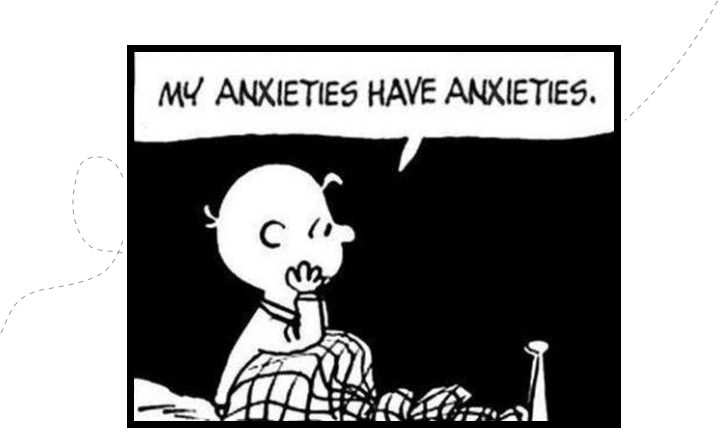
Beware The Anxiety Trap
Anxiety is a common trap that most of us entrepreneurs fall in to. The desire to be better than others. The burning focus on goals, that blinds us to our achievements. The insecurity about our value and relevance. The uncertainty about the future. The quest for perfection.
Being an entrepreneur is like being in constant competition and self-doubt.
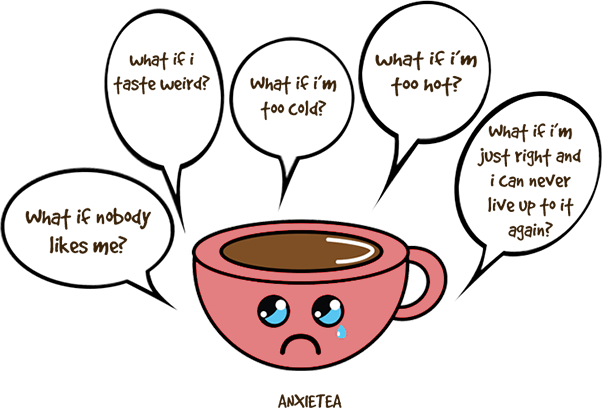
Anxiety is the dark side of the otherwise glamorous startup world. It’s rarely talked
about.
As founders, we want to appear in control. As if we’ve got it all worked out and put together. But that’s rarely the case.
Peer pressure aside, we’ve been programmed to think of our success in future terms. As human beings we are progress oriented. We set 5 year, 10 year, and lifetime goals. We move the goals further ahead as soon as we get close to them.
That’s in a way necessary. If we don’t have anything to work for, we’d be pretty depressed. And so, we spend our present chasing this ideal self that we believe we should be.

It’s no wonder so many of us are stressed, unhappy, and anxious. What’s worse? There are rising mental health issues.
In a 2015 study by Michael Freeman 49 percent of entrepreneurs reported having a mental-health condition. Thirty percent said they were depressed. A number alarmingly high compared with the general population (7%).
Are we giving up our lives in the pursuit of our dreams?
Must great success come with great sacrifice?
We want to be happier, we want more joy, we want to live more fully, we want more freedom. Aren’t those some of the reasons we demonstrate courage to start a company? Along the way we lose foresight and start the chase for the material, for acceptance.
Like the wise ones say, “We won’t be accepted because who we show we are, we are accepted for who we really are.”
Did a Google Engineer find the answer?
We tie our happiness to our expectations. Mo Gawdat, former Chief Business Officer for Google [X], in his book, Solve for Happy: Engineering Your Path to Joy proposed an equation:
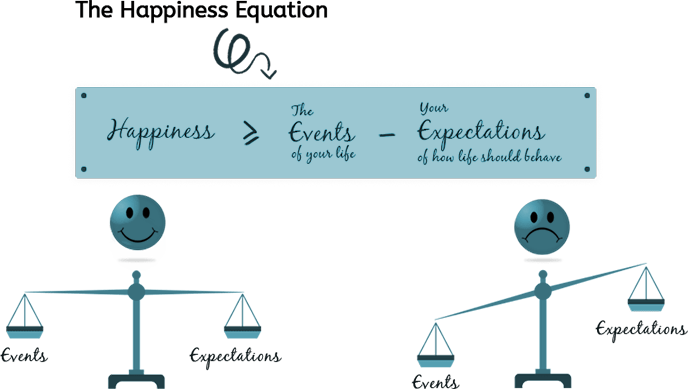
Simply put, it says, “ You are appy when life meets your expectations. ”
But is that the ight approach? Why must our happiness depend on an outcome?
Joy is not dependent on outcomes.
Joy happens when you stop depending on outcomes.
I will be happy when I win that deal. I will be happy when we have offices across the globe. I will be happy when I become a CEO.
Stop depending on “ I will be happy… ”
Joy happens when you enjoy what you do instead of looking at is as a means to an end. When the doing of the deed becomes a reward in itself.
That’s a good place to be because when you enjoy doing something, you do your best anyway. Irrespective of the outcome.
Chase a better future, but find happiness in the now. When you are able to find a balance between the thrill of your aspirations and the contentment in your present, you will find the untapped joy in your life.
Research proves that organizations with higher levels of happiness are more productive. It’s the same for individuals.
As demonstrated below, increased happiness can increase productivity by 31% and increase innovation by 300%.
A happy organization, a happy individual, is a prosperous one.
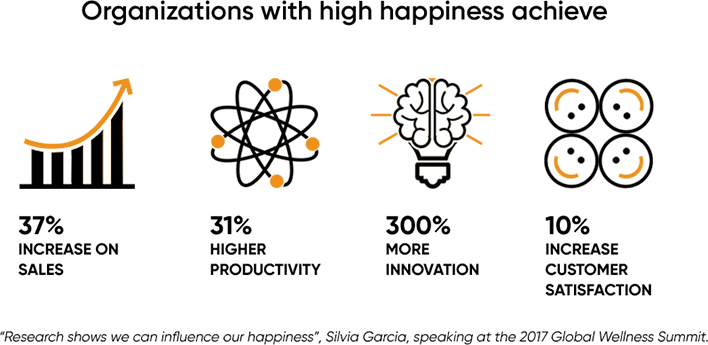

Architect Your Happiness by Flipping the Gap
How do you shake off years of conditioning? How do you learn to be happy with what you’ve achieved instead of what you are yet to do?
The first step – stop comparing yourself to others.
Comparing with others is a recipe for failure. In the digitally connected world we live it, it’s not tough to find someone who is doing better than you are.
When our brain makes a comparison, and we feel good, a chemical called serotonin is released. This makes us feel good.
But when your brain makes that comparison, and feels someone else is better, the supply of your happy hormone (serotonin) dries up. You feel dejected and low on confidence.
Instead, do what Jordan Peterson suggests in his book 12 Rules for Life: An Antidote to Chaos.

This is also called the reverse gap approach.
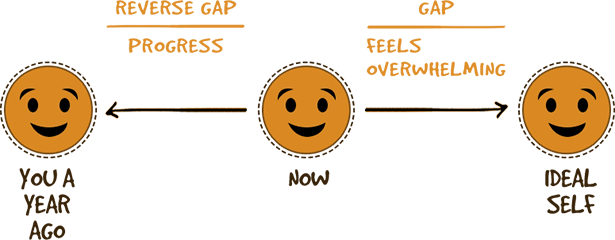
I first heard of the reverse gap approach from Dan Sullivan of The Strategic Coach .
The gap is when you let your happiness depend on your future self.
The reverse gap is when your happiness depends on how far you have come in comparison to yourself 2, 5, or 10 years ago… or even yesterday.
All of us make progress. It could be in leaps and bounds, or it could be in small increments. But we move the needle – every day.
A year ago your goal could have been to run a marathon. Maybe you can’t run it today. But are you able to run more than you could a year ago? Can you do a half marathon now vs. a mile long walk you did earlier?
If you can, that’s still progress. And if you keep at it, you WILL reach your goal.
Looking at your past experiences and appreciating your journey does two things:
1. It eliminates comparison to others . We start to learn that everyone is on their own journey, their own path and their own experiences. It is unique to them. Comparison with someone as unique as another individual is like comparing apples and oranges. Both are fruits. But completely unique from one another.
2. It makes you appreciate your own journey. It reflects your progress back to you. It makes us feel good because we made progress. The good feeling releases serotonin making us be more joyful and happier. This reduces anxiety.
Flipping the gap is about looking back on the past and appreciating your journey. To take joy in what have you achieved instead of what you still need to do. To ask, did you do the best you could? Were you the best possible version of yourself?
Here’s a small 5-minute exercise I’d like you to do:
Spend a few minutes focusing on how far have you come in the last one year.
Write down what’s the difference between you one year ago and now. What were your achievements? What improvements did you make?
Think about how much farther have you come from where you were
Practice this every day and let me know how it makes you feel.
This exercise is only going to work if you are truthful to yourself. If you aren’t honest with yourself, you won’t be able to make progress.
When you master the reverse gap approach, you’ll be able to feel gratitude. To give thanks for that which you do have. To find happiness in your journey, rather than the destination.
Remember, all you have is this moment, this experience. Make it an interesting one. Make it fun. Make it worth sharing. You don’t have to be a sad success story. You can be an inspiring, happy one.
Every year we select a few entrepreneurs to work with us to grow their companies while reducing the number of hours they invest working “in” the business. If this year if your year, if this is the year you will love to see extraordinary success for you business, we would be curious to see if we could help.
